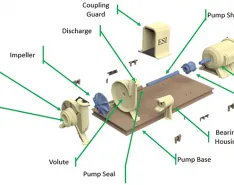Centrifugal Pumps
Centrifugal pumps are the most common pump, used in a wide variety of applications, especially water. They include one or more impellers that rotate and pull the fluid through. Impellers can be trimmed to change head or flow to enhance efficiency. They are not commonly used in non-Newtonian fluids.
Learn the difference between suction lift and flooded suction.
The first of a five-part NPSH primer series.
Communication between the plant and the pump vendor was key to success.
Jim Elsey helps you avoid common centrifugal pump mistakes
Improvements to make your equipment better than new.
Good design on the front end can avoid unnecessary expense in the long term.








